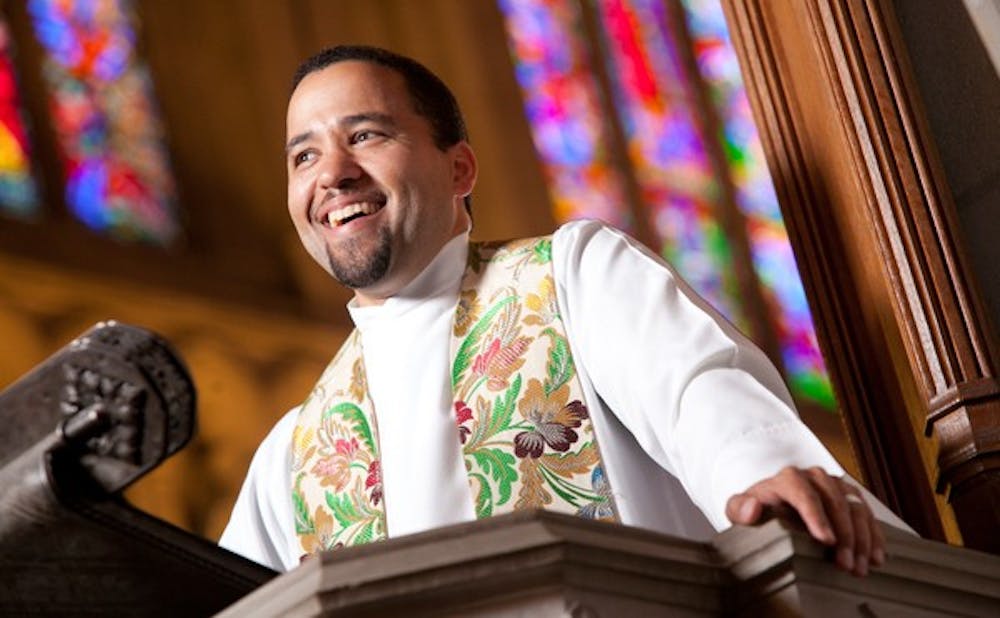Luke Powery was recently reappointed to a second five-year term as dean of the Duke Chapel. Powery's tenure on campus so far has focused on connecting with students and bridging faith and learning. The Chronicle spoke with Powery about his successes so far and his plans for the future.
The Chronicle: What do you consider to be your biggest accomplishments during your time as dean?
Luke Powery: I would put it in a broader perspective, I don't know if there’s one thing. There are several things that have begun to happen. Preaching archives are being developed, and we're expanding our Organ Scholars program. What’s happened is that we’re beginning to partner in more obvious ways and being intentional about collaborations and partnerships as a general expansion of what we do. So stretching out our arms across the University—to the library, to the Duke Jazz [program]. We have various partnerships that are being solidified to help people know that we’re here and we’re here to serve the University.
TC: What do you hope to do during your second term?
LP: I think build on four key areas. With preaching, to expand that archive and make it more accessible. We’re planning on building a website that will interface with that digital archive to use for research and teaching. Then the area of sacred arts. So expanding what we do. We have a rich musical history but taking that beyond even the traditional arts and moving toward the visual arts and partnering with the [Nasher Museum of Art] to bring in various exhibitions and using the Chapel space to exhibit art.
We’re also in the process of thinking through how to deepen our community connections. We rent a house in the west end of Durham where undergraduates who have recently graduated can live together and partner with a nonprofit while they’re living in a community for a year. They’re called the PathWays Fellows.
The last is interfaith engagement and that has to do with our work in religious life across the various campus ministries but also a new program that is starting in the Spring called the Interreligious Scholars Program. But beginning to get students coming together from different faiths and traditions to develop religious literacy and a deeper understanding of each other. My hope is that we will be a place in general where people will say [they] can find sanctuary there.
TC: Your strategic plan for the Chapel emphasizes the Chapel’s role in bridging faith and learning for the University. Why do you consider that to be important?
LP: I think it’s important because it taps into the deep roots and history of Duke. It also says that intellectual life for a major research university should also be integrated into one’s spiritual life. So the idea of being a whole person. One’s faith and one’s learning are not necessarily mutually exclusive. One takes one’s whole being in the educational enterprise and vice versa. It’s especially important at a major research university. There are many students, faculty and staff that are people of faith from various traditions, and I think our goal is to not let people forget a part of their identity. And the life of faith and religious practice is not going away. Religion plays a significant part in politics, and it’s not just destructive, it can be constructive. I think it’s vital for a university to created space where conversations about faith can happen.
TC: During your first term as dean, you created a position for student engagement. What does student engagement look like regarding the Chapel?
LP: On many levels, that particular position is one of our positions in student ministry to really connect with students and bring students together around the arts in particular and to reach out to traditionally underrepresented student groups, but really all students. Our student ministries happen whether it’s one-on-one through mentoring. It happens in the classroom. I have a couple of staff members who teach undergraduates around various world religions and ethics.
[It's about] giving students opportunities to connect with meaningful conversations. It may even happen on Spring Break trips, mission trips, opportunities to serve in the community. We’re trying to take a holistic approach. Students are the heart of any university. My hope is that students will know we are here for all of you.
Get The Chronicle straight to your inbox
Signup for our weekly newsletter. Cancel at any time.

